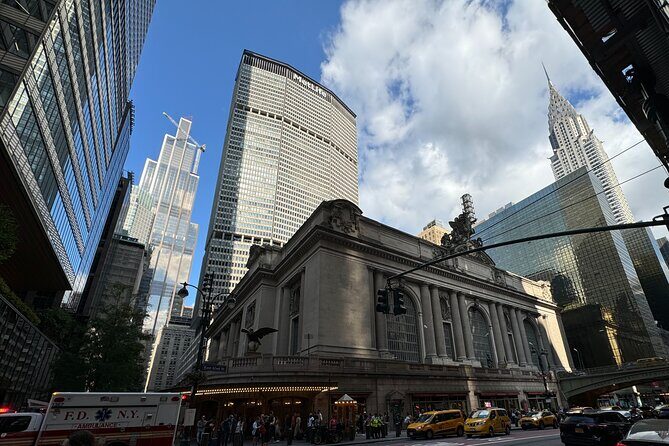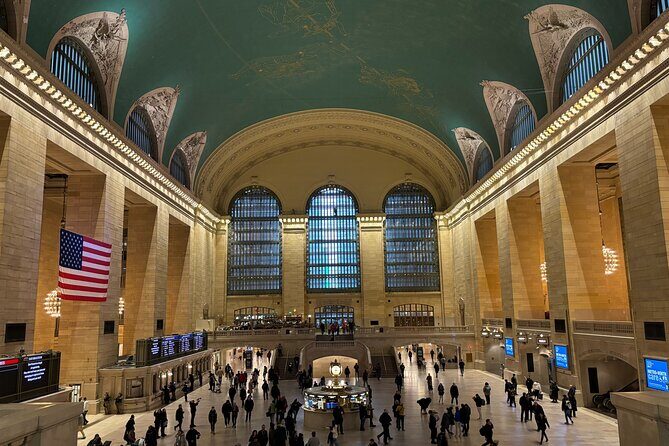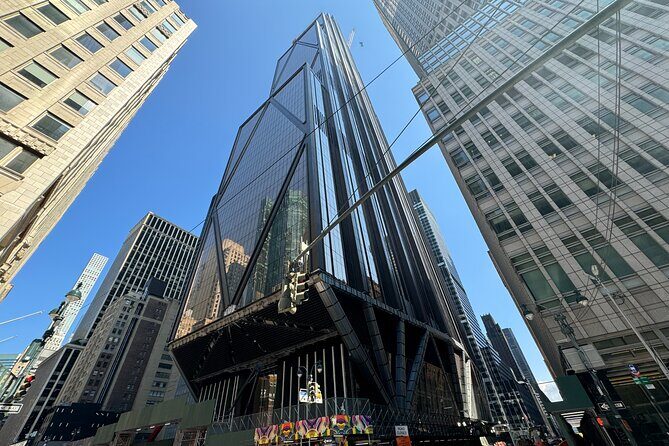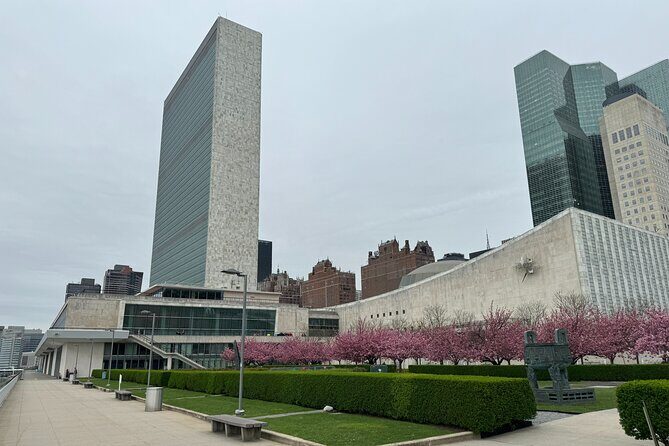If you’re a lover of architecture, history, or just keen to see a different side of New York City, the Midtown East NYC Architecture Walking Tour is worth considering. For $49 per person, this roughly two-hour journey takes you through some of the most iconic and visually striking buildings in the heart of Manhattan. Led by knowledgeable guides, you’ll enjoy a close-up look at landmarks like Grand Central Terminal, the Chrysler Building, and the United Nations Headquarters—each with its own story to tell.
What we love most about this tour is how it combines stunning architectural details with fascinating tidbits about the city’s evolution. The tour’s small group size (limited to 10 people) ensures you get plenty of individual attention and the chance to ask questions. Plus, the use of personal headsets means you won’t miss a word even if you’re a few feet from the guide.
A possible downside is that, at just around two hours, this tour is a quick overview—so if you’re a die-hard architecture buff or want to explore in more depth, you might want to supplement it with additional visits. However, for anyone new to NYC or on a tight schedule, it’s a perfect introduction. It’s especially well-suited for travelers who appreciate stunning views, want to learn about architectural styles, and enjoy walking outdoors while soaking up the city’s vibrant atmosphere.
Key Points

- Concise and engaging two-hour walk through Midtown’s architectural highlights.
- Small groups (up to 10 people) ensure an intimate and interactive experience.
- Expert guides provide insightful stories behind each building, enriching your understanding.
- Stunning landmarks like Grand Central, Chrysler Building, and the UN make for memorable sights.
- Walking distance is manageable, with about 30 minutes of actual walking.
- Price point offers good value for a guided tour focused on architecture and history.
A Closer Look at the Midtown East NYC Architecture Walking Tour

Walking through Manhattan’s Midtown East is like flipping through a living history book made of steel, glass, and stone. This tour offers more than just pretty facades; it’s about understanding the city’s architectural evolution and the stories behind the structures that define it. Let’s walk through the itinerary and see what makes this tour special—and what you might want to keep in mind.
If you're drawn to exploring New York City on foot, we've looked into these other walking experiences
Starting at Grand Central Terminal
Our journey begins at the famous Vanderbilt Avenue Plaza, where the grand entrance of Grand Central Terminal immediately transports you to the early 20th century. Built in 1913 by Reed & Stem and Warren & Wetmore, this Beaux-Arts masterpiece is more than just a train station; it’s a symbol of New York’s ambition and elegance. The tour guide (we had a passionate local named Mark) shared fascinating insights into the architectural details, like the celestial ceiling and the impressive facade.
Many visitors comment on how Grand Central’s beauty surpasses expectations. One review stated, “We loved the way the guide pointed out details like the zodiac signs and how the space feels like a cathedral of transportation.” It’s a lively, bustling spot, yet the tour allows you to appreciate its architectural grandeur without the usual crowd noise.
From the Beaux-Arts to Modernity: One Vanderbilt
Next, we moved just a few blocks to One Vanderbilt, completed in 2020 by Kohn Pedersen Fox. This sleek, LEED-certified skyscraper signals how Midtown continues to evolve. Standing beside it, you can see how modern design blends with the historic skyline. The guide highlighted the building’s sustainable features and how it redefines the city’s vertical landscape.
Although only a brief stop—around five minutes—you’ll appreciate the contrast between the historic and the contemporary, making it clear how NYC’s architecture is constantly in motion.
The MetLife Building and Artistic Styles
Next up was the MetLife Building (formerly Pan Am), built in 1962 by The Architects Collaborative with Walter Gropius. This building, with its International Style, bridges the old and new. It’s easily recognizable and often debated among architecture fans for its massive size and distinctive placement above Grand Central’s train tracks.
A reviewer mentioned, “Seeing the MetLife Building from the outside after hearing about its design gave me a new appreciation for its boldness.” It’s a prime example of mid-century modernism shaping the skyline.
The Art Deco Marvels: Waldorf Astoria and Chrysler Building
Midtown’s Art Deco gems are a highlight. The Waldorf Astoria (built in 1931) is a luxurious icon that’s currently undergoing a residential conversion, but its facade and interior details are still worth noting. It’s a symbol of global prestige and elegance, and its history as a hotel that hosted presidents and celebrities adds to its allure.
The Chrysler Building (1930) is often called NYC’s most beloved skyscraper. Its ornamentation, with sleek metalwork and the famous spire, embodies the Art Deco style at its finest. The guide pointed out the zigzag motifs and the setback design that were mandated by zoning laws of the era. Visitors often remark on how visually stunning the Chrysler Building is, especially when viewed up close.
The Modern Take: The Ford Foundation and the Daily News Building
Moving on, the Ford Foundation Building (1967) introduces a more human-centered modernism. Its indoor garden offers a glimpse of how modern architecture can incorporate nature into urban spaces. The guide emphasized its revolutionary indoor garden, making it a favorite for those interested in sustainable design.
A quick stop at the Daily News Building (1930) reveals a different kind of early skyscraper. Famous for its giant lobby globe, it’s a classic example of early modernism. Many visitors enjoy the visual impact of the globe and the building’s sleek lines.
Tudor City and the UN: Residential Innovation and Global Diplomacy
The tour then takes us to Tudor City, one of the world’s first residential skyscraper communities. Built in 1928, its neo-Gothic charm offers a peaceful contrast to the bustling city below. It exemplifies urban planning innovation and is perfect for those interested in how residential architecture shapes city living.
Finally, we arrive at the United Nations Headquarters, designed by an international team led by Oscar Niemeyer and Le Corbusier. This symbol of peace and international cooperation has clean, modernist lines and expansive plazas that you can appreciate even from outside. The guide explained the significance of its design, highlighting how its architecture reflects the UN’s ideals.
In Practice: What to Expect and How It Feels
Throughout the tour, we appreciated how expert guides kept the narrative engaging, blending architectural facts with stories of New York City. The personal headsets meant everyone could hear clearly, even in the lively streets. The walking is manageable, with about 30 minutes of actual movement, making it accessible for most.
The small group size (maximum 10) fosters a more relaxed, conversational atmosphere where questions and curiosity are encouraged. Our guide, Lisa, was enthusiastic and clearly passionate about architecture, which added a lot to the experience.
The Practical Side: Value and Considerations
At $49, this tour offers good value—especially considering the expert narration and intimate setting. It’s a chance to see many of Midtown’s most iconic buildings without the hassle of navigating on your own or paying for entry tickets. You’ll learn details that bring buildings to life and gain a new appreciation for the city’s architectural diversity.
One point to consider is the duration—being only two hours, it’s a quick overview. If you’re a dedicated architecture enthusiast, you might want to plan a follow-up visit to some buildings or explore other tours focusing on specific styles like Art Deco or modern skyscrapers.
Who Is This Tour Best Suited For?
This walking tour is ideal for first-time visitors who want a broad yet informative introduction to Midtown Manhattan’s architecture. It’s also perfect for history buffs and design lovers who appreciate stunning views and narrative stories behind the buildings. With its small group size and expert guides, it’s a great way to make a quick, meaningful connection with NYC’s skyline. If you love learning about iconic landmarks and enjoy outdoor walking, this tour hits the sweet spot.
FAQs

How long is the tour?
It lasts approximately 2 hours, including about 30 minutes of walking.
Where does the tour start and end?
It begins at Vanderbilt Avenue Plaza and ends at the United Nations Headquarters.
Is the tour suitable for children or people with mobility issues?
Most travelers can participate, and the walk is manageable, but it does involve some walking on city sidewalks. Check if mobility is a concern.
Do I need to buy tickets in advance?
Yes, the tour features a mobile ticket option and is limited to 10 participants, so booking ahead is recommended.
What’s included in the price?
You get a guided walking tour with professional headsets for clear narration.
Can I get a private tour?
Private tours are available and conducted in multiple languages—please contact the provider for details.
What happens if it rains?
The tour requires good weather; if canceled due to rain, you’ll be offered a different date or a full refund.
Final Thoughts

The Midtown East NYC Architecture Walking Tour offers a well-balanced mix of history, design, and breathtaking city views. It’s a fantastic way to get a focused, insider’s perspective on some of Manhattan’s most famous structures, without feeling rushed or overwhelmed. It’s particularly suited for those who love stunning architectural details and urban stories and prefer a small, guided experience to explore at a relaxed pace.
If you’re visiting New York City and want an engaging, educational walk that showcases the city’s architectural grandeur, this tour is a smart choice. It provides a wonderful snapshot of Manhattan’s evolving skyline—perfect for making your visit memorable and visually inspiring.
Note: Always check the weather forecast before booking, and consider combining this tour with other New York attractions for a full day of discovery.
More Walking Tours in New York City
- New York City Diamond Walking Adventure
- New York City : Private Walking Tour With A Guide (Private Tour)
- Private 9/11 Memorial and Ground Zero Walking Tour with Optional One World Observatory
- Explore New York Lower Manhattan’s with a Walking Quiz
- New York City Central Park Walking Tour with a Guide
- New York City Self-Guided Walking Tour
More Tours in New York City
- 3-Hour Private Guided NYC Central Park Tour with Carrousel Ride
- Chauffeured 2 hour Private Tour in a Dodge Challenger Convertible
- Boston, New Haven and Rhode Island 2-Day Tour from New York
- Bar, Lounge and Rooftop Tour NYC
- Presidents Trump and Obama’s Life Private Tour Expert Guide
- Guided Electric Scooter Tour of Central Park
More Tour Reviews in New York City
More New York City experiences we've covered
- Central Park Bike Rental In New York City
- Stolen Archives: Self-Guided Mystery Adventure in Central Park
- New York – East Hampton: Premium Chauffeur Transfer
- New York Central Park Zoo Ticket
- New York City Diamond Walking Adventure
- New York City: Harlem Gospel Express
- 3-Hour Private Guided NYC Central Park Tour with Carrousel Ride
- From Skyscrapers to Cobblestones NYCs Brooklyn Bridge Adventure
- Chauffeured 2 hour Private Tour in a Dodge Challenger Convertible
- Boston, New Haven and Rhode Island 2-Day Tour from New York
- Reignite the Spark with a Couples Massage in NYC 90 Mins
- New York City Sunset Cocktail Cruise on Small Yacht
